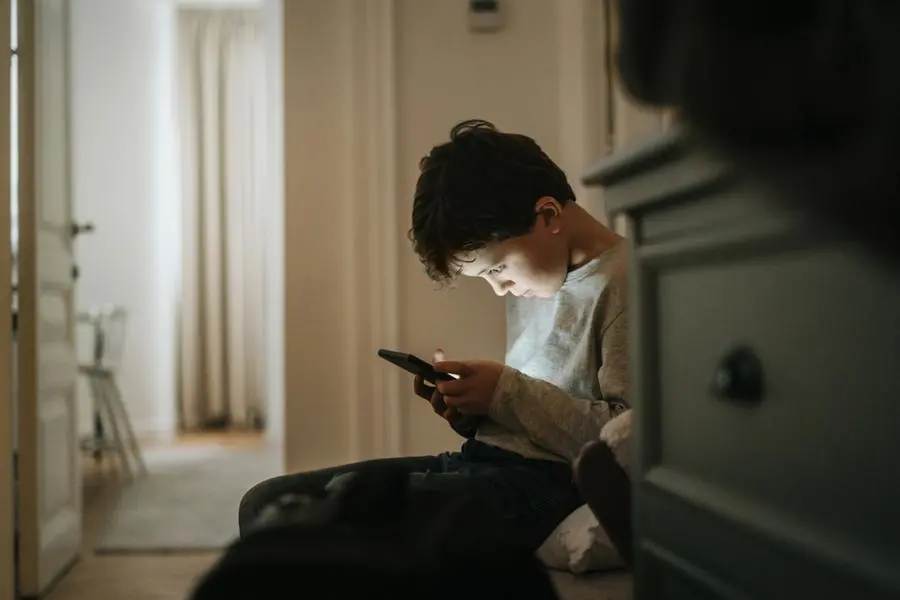PHOTO
Last week, teenager R.N. spent 17 hours 36 minutes on his phone on one day and 14 hours on another. “I was just speaking to my friends on Botim and scrolling through social media,” said the 15-year-old, speaking to Khaleej Times on condition of anonymity. “I didn’t realise that I had racked up that many hours on my screen.”
This reflects a growing incidence of youngsters spending too much time on their screen, severely affecting their sleep cycle. “There's growing concern that many children and young people aren't getting enough sleep,” said Dr. Mona Alharbi, specialist pediatrician at Aster Hospital Al Qusais. “Various studies suggest that a significant portion of this demographic is not meeting recommended sleep durations. Exposure to screens, such as smartphones, tablets, computers, and TVs, before sleep can interfere with the body's natural sleep/wake cycle due to the blue light emitted by these devices.”
Various studies have shown the detrimental effects screens have had on sleep, with many saying it was leading to chronic sleep deprivation among youngsters. Dr Lene Janse Van Rensburg, Head of Wellbeing at Brighton College said that she has seen the trend of poor sleep particularly among teenagers. “Our older pupils between the ages of 13 and 18 struggle with sleep,” she said. “One of the issues is that children are not being sufficiently educated about good sleep. We need good them to have good ‘digital health’ so that they can be tech-savvy but are not spending hours on their devices.”
Other factors
There are some other factors that play a part in contributing to poor sleep time routine, according to John Bell, Founding Principal at Bloom World Academy (BWA). “With people from so many different countries, there are cultural differences on when bedtime is,” he said. “Another issue that makes it difficult to enforce early bedtime is the leisure and social industries in Dubai. There are lots of after school activities. Certain families eat out and the nights are quite late.”
According to Dr. Mona, academic pressure and environmental factors can also play a role in poor sleep. “Busy schedules filled with schoolwork, extracurricular activities, and social commitments can lead to stress and anxiety, which may affect sleep quality and duration,” she said.
Dr. Lene said she had seen the impact of this among students she worked with. “When exams are around the corner, students get anxious,” she said. “This impacts sleep making them even more anxious. So, it is a catch 22 situation.”
Impacts
John said that the impact of poor sleep on children was very significant. “You can tell a tired child very easily,” he said. “They are grumpy and the impact of it is enormous. It is really hard to teach a tired child.”
Dr. Lene said that it was important to understand that it was important to understand that sleep needs differed from student to student. “Individual children have different sleep needs
and they go through different development stages,” she said. “So it is important to watch out for indicators. If they have difficulty getting up in the morning, are sleeping excessively during the daytime and have poor academic performance, irritability or lack of focus, it is an indicator that they are not getting enough sleep.”
Solutions
According to John, the late start time at BWA has made a huge difference. The school is one of the very few in the country that begin at 9am. “We have well-rested children, who are motivated,” he said. “Before we start school, we have some physical activities like sport or exercise and it has genuinely helped them be more ready for school.”
He also stressed that schools need to cut down on their screen time. “More and more school should have blended approach with some lessons completely screen-free and no technology at all,” he said. “Currently, there is too much screen time during school time
Dr. Lene said it was important to educate children about the importance of good sleep health and gave the case study of a boy she worked with. “He was struggling to sleep despite doing all the good sleep health practices like putting away screens an hour before bedtime and having sufficient exercise,” she said. “I asked him what he was doing before bed and he said he was eating half a bar of chocolate. He had no idea that this was impacting his sleep. Once I asked him to stop doing it, he came back a week later and said he was sleeping much better.”
She said once students understood the importance of sleep and how to maintain good hygiene, they are completely on board to make changes.
Copyright © 2022 Khaleej Times. All Rights Reserved. Provided by SyndiGate Media Inc. (Syndigate.info).





















